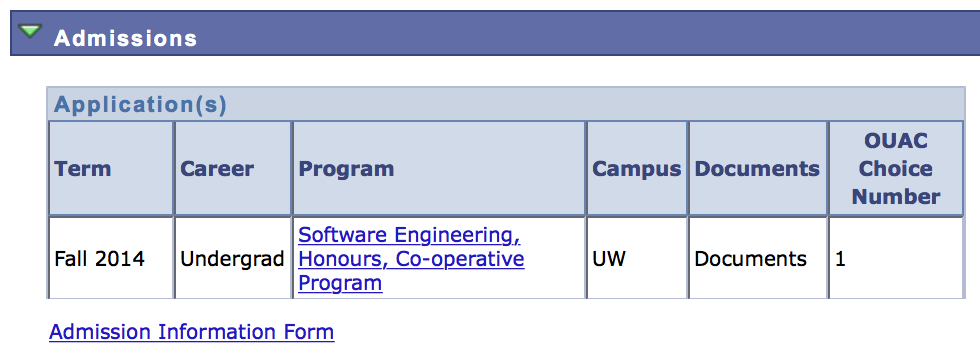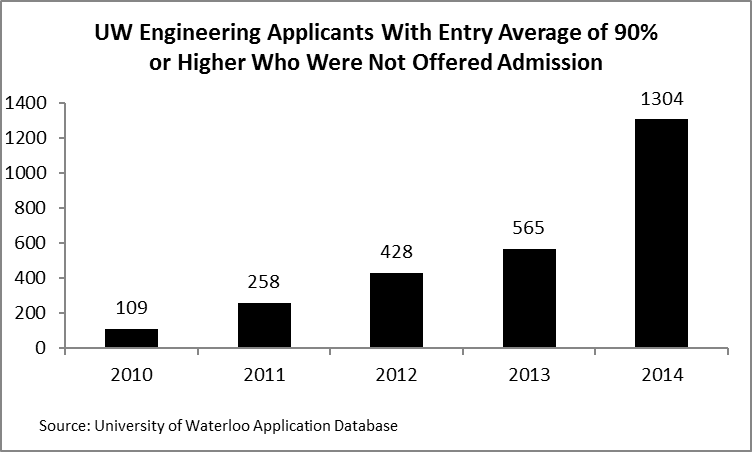How to Write a Great AIF
For most programs at Waterloo, it is strongly recommended to fill out the admission information form (AIF). By the end of this post, you guys will learn how the AIF may be the difference between an offer and rejection.

September 2018 update: Check out my new up-to-date post on ‘How to get into Waterloo Engineering.’
My Story
I applied to Waterloo and submitted my AIF exactly one year ago. Two months later, I received an offer to my top ranked program in the “early” round of Waterloo Engineering offers. In this round, about 30% of the offers were handed out and Software Engineering applicants had averages of mid-high 90’s. For example, one of my friends had a 97% average, but did not receive an early offer. Although my average was 3-4% lower than his, I was admitted into the program. This example just shows how important the AIF can be. A few months later, I was awarded a Waterloo Faculty of Engineering scholarship, on the basis of strong grades and AIF. Had I not spent so much time and effort on my AIF, I probably wouldn’t have received an early offer or an additional scholarship.
Just take a look at the graph below (taken from Professor Bill Anderson’s blog). Over 1300 applicants with 90% average were not offered admission. In an age where applicants all have excellent grades, writing a great AIF is the best way to differentiate yourself.

By now, you guys are probably convinced that the AIF is crucial for a successful application. I’ll briefly go over the components of the AIF.
Components of the AIF
You will have to fill out the first three sections of the AIF and any additional sections required by the program you’re applying to. Engineering students have to fill out the Engineering section and Math students have to fill out the Math section. If you’re applying to multiple programs at Waterloo, you only need to complete one AIF.
Part A: You write a short essay response about why you’re applying to Waterloo and why you’re interested in your specific programs. It has a 900 character limit, which is about 140 words. In addition, you list your extracurricular activities (with an optional section to further explain what you did), employment and volunteer history, and past accomplishments.
Part B: This is where you talk about any special circumstances which may have affected your academic performance (note: this is optional). There’s also space at the bottom to add any additional information about yourself. Most people choose to leave this question blank. For myself, I talked about my shadow day experience at Waterloo.
Part C: Basically fill in information about your courses and grades. If you’ve taken courses outside of your day school such as in night school, summer school, online, or a private school, you’ll have to provide a reason.
Engineering Section: The first question asks you to write about your Engineering interests and goals, and the second question asks you to write about a book you particularly enjoyed. If you have applied to Software Engineering or you have listed it as an alternate, you’re required to write about your programming experience. Note: taking a high school programming course is sufficient. If you’re interested in being considered for an Engineering scholarship, tick off the box. Finally, you can list up to two alternate Engineering programs. For more information about alternate offers, read this post.
Math Section: The math section is focused on your past and future math and computing contest scores. It also asks for reference information from a Senior mathematics teacher. As the website states, your teacher does not have to do anything at this time, but may be contacted by admissions personnel to provide a reference.
AIF Grading
Professor Bill Anderson wrote about the process and scoring of the AIF, so check out his post here.
Tips & Strategy
Before writing the AIF
- Research about the University of Waterloo and your program.
- Attend the open houses and outreach events (see the Shadow Day program).
- Talk to your teachers, current Waterloo students, and alumni.
- Compile a list of all your activities and accomplishments.
While writing the AIF
-
Write personal responses. Last year alone, there were 10,000 AIF’s to be read by the Faculty of Engineering. If you write something generic, your application will be just like the others. Pretend you receive a Christmas card from someone. Would you be more impressed if it said “Happy holidays, hope you had a great year!” or if it included something personal like “I’m so glad to have met you this year. Remember that time when we went skating together… Good times.” Demonstrate to the reader that you have put in a lot of thought and effort in writing a personal response. Don’t be generic.
-
Be passionate and genuine. Explain to the reader why you want to study at Waterloo so badly. What makes you so passionate about the University of Waterloo? For me, it was the boundless opportunities to grow and learn. If you’ve done extracurricular activities outside of school, make sure that you highlight them and show off how passionate you are. For the reading interest question, choose something that you really enjoyed. It doesn’t necessarily have to be engineering related. Trust me on this one, AIF readers enjoy reading about passionate people. Of course, be genuine in your responses and don’t write fraudulent statements.
-
Check out the profiles of current students. You can view the Engineering Ambassadors’ profiles here. Take a look at what current students are saying about their programs and their experiences at the University of Waterloo. Their profiles reveal more reasons why Waterloo is so awesome and you can even draw in ideas and inspiration from them. I would highly recommend learning from their responses and somehow incorporating that into your AIF.
-
Master the fundamentals. What I mean by this is make sure your responses are well-written and grammatically correct. When writing your responses, I would recommend saving them on a Word document. The amount of times I’ve heard “OMG, I have to restart my AIF” is ridiculously high. Submit your AIF before the deadline (I recommend even earlier). Be honest, don’t make stuff up. If you get caught, say goodbye to Waterloo.
-
Remember who the reader is. Too often, people write excellent responses, but they forget their target audience. The main purpose of the AIF is to convince the admission officer that you deserve to be at the University of Waterloo. How can you convince them? First, you have to demonstrate that you’re genuinely interested in studying here (hint: see Part A, question 1). Show them that you’ve done your research about the university and your specific program. Second, you have to prove to them that you would be prepared for co-op job applications. This is where your extracurriculars, employment background, and special awards come in. If you have tons of activities and awards, make sure that you communicate it effectively. If you’re lacking in this department, don’t worry, it’s not too late to get involved. As for filling out the form, you can come up with creative answers that demonstrate your interest in activities outside of school. You can also use the additional 600 character response to write about stuff that you would take on in the future. Lastly, you have to convince them that you have a desire to grow. Keep in mind that the University of Waterloo ranks number one in producing the Leaders of Tomorrow.
After completing the AIF
- Proofread your application, it should be flawless.
- Ask your peers, family, and teachers to read over your application.
- Hope for the best. If you did the best you could do, that’s all that matters at the end of the day.
Conclusion
In conclusion, the AIF readers don’t have this preconceived notion of what the perfect responses and extracurriculars are. They’re simply looking for applicants who are well-rounded, demonstrate passion and interest in the University of Waterloo, and have the potential to grow. In addition, the applicant must have great communication skills. If your average isn’t the best, a great AIF can potentially get you an admission offer. If you have great marks, the AIF can further optimize your chances. The AIF might even make you a couple thousand dollars richer.